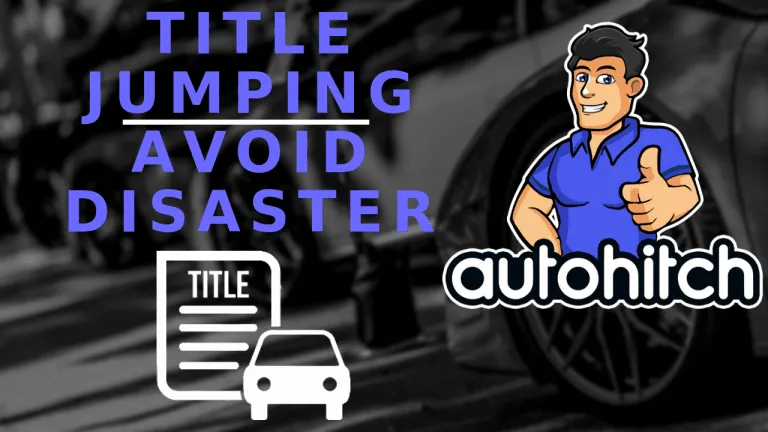What Is Title Jumping and How to Avoid It?
After years of selling cars, I’ve seen many scams, both as a dealer and now running my car-buying service. One issue I continue seeing private sellers struggle with is: What is Title Jumping and how to avoid it.
So, I created the article below, covering almost everything you need to know about Jumping titles, open titles, and what you can do to ensure you’re not a victim of a scam.
Key Takeaways: Understanding Title Jumping
- Definition of Title Jumping: Title jumping occurs when a vehicle is sold without transferring the ownership into the seller’s name, an illegal practice also known as title skipping or floating.
- Motivations for Title Jumping: Sellers may engage in title jumping to avoid taxes, fees, or dealer licensing requirements, or to conceal vehicle issues such as salvage or flood damage.
- Problems Caused by Title Jumping: It can lead to difficulties in registering the vehicle, issues locating the seller, and the risk of inheriting a salvaged or flood-damaged car without knowledge.
- Penalties for Title Jumping: Penalties vary by state but can include fines, imprisonment, criminal charges, and for dealers, suspension or revocation of licenses.
- Avoiding Title Jumping: Buyers should inspect the title, confirm the seller’s identity, use services like Carfax, and promptly register their vehicle. Sellers must always title the car in their name before selling.
Relevant Articles To Read About Titles:
- How to Erase Ink From a Car Title
- How To Sign Over A Car Title
- What is an E Title (Electronic Car Title)
- Can a Car Title Be Signed Over Twice?
- Vehicle Title Washing – The Keys To A Clean Title
- How to Transfer A Car Title To A Family Member
- Two Names On Car Title How To Remove One
Table of Contents
What Is Title Jumping?
Title Jumping occurs when someone buys a car and then resells it without ever registering the vehicle in their own name.
Jumping title is illegal because it is a scam by the seller, usually to evade paying taxes. For the unsuspecting buyer, this can cause major problems, such as not being able to legally register the car. I will discuss problems in more detail below.
Example of Jumping Title:

For example, if Bob sells his truck to Jane, but Jane sells it to Mike without ever registering it in her name, Jane has Title Jumped. The truck’s title history will show it going from Bob to Mike, with Jane’s ownership completely skipped.
A Breakdown on The Topic of Title Jumping:
| Topic | Description |
|---|---|
| Jumped Title | When someone buys a car, doesn’t register it, and then sells it to someone else. |
| Skipped Title | If you purchased a skipped title, the buyer’s section of the title is filled out by a middle man. |
| Jumped Title | If you purchased a jumped title, finding the original owner is crucial as the state DMV only acknowledges them as the seller. |
| Possible Methods to Resolve Title Issues |
|
| Penalties for Jumping Title | Fines, Jail Time, or Revocation of Dealers License |
| The Seller’s Name Isn’t On The Title | You will not be able to transfer ownership until the person named on the title has signed it. |
| Buying a Car With the Title Already Signed | If the title is already signed but lacks additional buyer information, it is considered an open title, presenting certain risks. |
| Selling a Car Without a Title | In most cases, selling a car without a title is not legal. However, there may be options such as obtaining a surety bond or registering the vehicle in Vermont under specific conditions. |
| Skipped Title vs. Jumped Title | Title Jumping is a felony punishable by fines and even jail time. |
| Warning Signs to Avoid Jumped or Skipped Titles | Indicators include the title not being in the seller’s name, missing or forgotten signatures, and titles already signed before the purchase agreement. |
| Is title jumping a felony? | If you purchased a skipped title, the buyer’s section of the title is filled out by a middleman. |
Title Skipping & Floating title
Title Jumping is also referred to as Skipping Title or Title Floating.
What is an Open Title?
In order to Jump Title, you need what is called an Open Title, and this is a title where the seller has filled out all of their information to release ownership but has left the buyer’s information blank.
Why Would Someone Jump a Title?
There are several reasons why a seller may participate in illegal title jumping:
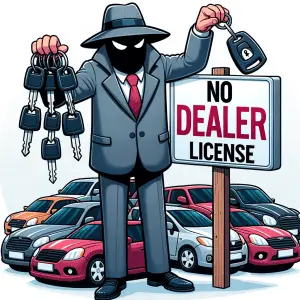
- To avoid paying taxes and fees associated with titling a vehicle. This includes sales tax, registration fees, and titling costs that can quickly add up.
- To sell vehicles without holding a dealer license. In many states, you must register as a dealer if you sell over a certain number of cars per year. Title jumping enables illegally operating without a dealer license.
- To hide issues with a vehicle from the buyer. Branded titles like “salvage” or “flood damage” may not appear until the title is transferred. An open title allows hiding problems.
- To make a quick profit reselling vehicles without a traceable paper trail.
Title jumping occurs frequently with private party sales online via platforms like Craigslist and Facebook Marketplace.
But,
It can also occur at smaller used car lots!
Problems Caused by Title Jumping
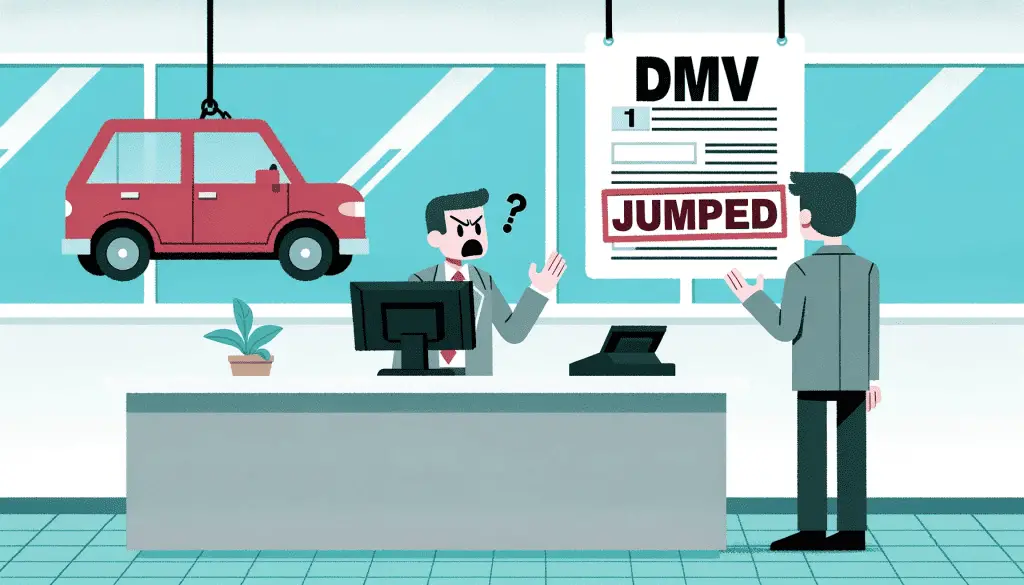
When you purchase a car with a jumped title, it can lead to many issues:
- Difficulty registering the vehicle – Since the title is still under a previous owner’s name, registering the car with the DMV in your name can be problematic.
- Issues with locating the seller – With no seller information on the title, tracking them down to fix problems becomes nearly impossible in some cases.
- Stuck with a salvaged or flood car – Title brands like “salvage” or “flood damage” may not appear until the next title transfer. An open title can hide this from buyers.
- The Wrong person incurs fines or violations – Without proper transfer documentation, previous owners may still face consequences like parking tickets.
Additionally, an open title with no seller information provides no records proving you actually bought the vehicle. That’s problematic if the car is found to be stolen or has other serious issues.
Title Jumping Explainer Video
What To Do if you Are a Victim of Title Jumping
If you discover you bought a car with a jumped title, here are some potential remedies:
- Contact the seller and previous title owner to try and get the title properly signed over to you now.
- Purchase a “bonded title” in states that allow it – this provides title documentation while giving time for disputes.
- File a legal claim against the seller, especially if it was a dealership that engaged in title jumping.
- Report the issue to your local DMV and see if they can assist with obtaining a new title.
- Sell the vehicle and cut your losses.
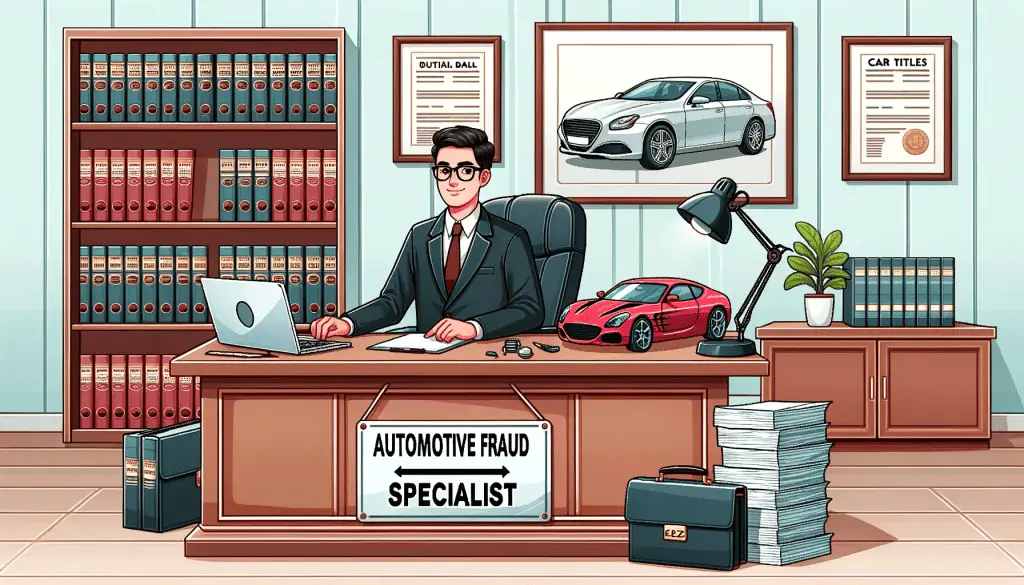
Resolving title jumping often requires patience and persistence. From my experience, bonded titles create hassles for dealers and buyers alike, so try to avoid that option as much as possible!
Consulting a lawyer who specializes in automotive fraud can also help navigate the proper procedures in your state.
Penalties For Jumping Title
The penalties for title jumping vary depending on the jurisdiction and state you purchased the vehicle in, plus the severity of the offense.

Can you go to jail for selling a car without a title?
In short, yes, you can face jail time for selling a car without a title, however, the severity of punishment and additional penalties will vary widely based on the state the crime was committed in.
I have never personally heard of anyone going to Jail for a jumped title, but I wouldn’t doubt that it has happened for habitual offenders.
Some possible consequences for selling a car with a jumped title include the following:
- Fines: The penalties for title jumping vary by state, but they typically include fines and possible imprisonment. For example, in California, title jumping can result in a fine of up to $1,000 and imprisonment for up to six months. In Texas, title jumping can result in a fine of up to $10,000 and imprisonment for up to one year.
- Criminal charges: In some cases, title jumping can lead to criminal charges, such as fraud, forgery, or even grand theft auto. Convictions can result in probation, community service, or incarceration.
- Suspension or revocation of dealer licenses: Dealers who engage in title jumping may face the suspension or revocation of their dealer licenses, hindering their ability to operate legally within the industry.
Can You Sue Someone For Title Jumping?
Yes, you can sue someone if you are the victim of Title Jumping.
You may have grounds to file a civil lawsuit for fraud or breach of contract, depending on your state’s laws and the details of the fraudulent sale. Typical next steps include:
- Filing a police report about the title jumping fraud
- Documenting evidence from the sale like paperwork, photos, and communications
- Contacting agencies like your state’s DMV to report the issue
- Consulting a lawyer experienced in title fraud cases
The lawyer can advise if small claims court is an option for recovering damages from the seller or if hiring them to file in civil court is needed for higher-value vehicles.
Challenges can arise if the seller provides false information or disappears to avoid legal responsibility.
But most states still have options to pursue them legally for title scams. An experienced attorney will know the laws and processes to guide you best.
State-by-State Punishments for Title Jumping
If you ask if Title Jumping is Illegal in your State, the answer is yes! Title Jumping is illegal in all 50 states, and below are some examples from 10 states on their specific laws:
| State | Fine/Jail Time | Bond Status |
|---|---|---|
| California | $1,000 fine and 1 year in jail | Bonded titles allowed |
| Texas | Up to $4,000 fine and 2 years imprisonment | Bonded titles allowed |
| Missouri | Penalties begin 60 days after sale | Bonded titles allowed |
| Georgia | Felony offense, heavy fines or jail time | Bonded titles allowed |
| Iowa | Heavy fines or jail time | Bonded titles allowed |
| Pennsylvania | Heavy fines or jail time | Bonded titles NOT accepted |
| Kentucky | Heavy fines or jail time | Bonded titles NOT accepted |
| Delaware | Heavy fines or jail time | Bonded titles NOT accepted |
| New Jersey | Heavy fines or jail time | Bonded titles NOT accepted |
| Maryland | Heavy fines or jail time | Bonded titles NOT accepted |
How to Avoid Title Jumping – No Open Titles
As a buyer, you can take steps to avoid accidentally purchasing a car with a jumped title:
- Inspect the title and confirm the seller’s name is on it and matches their identification. Never accept an open title.
- Run the vehicle’s VIN through services like CARFAX before purchase to identify title red flags.
- Require the seller to sign and date the title during the transaction.
- Promptly register the newly purchased car in your name with the DMV.
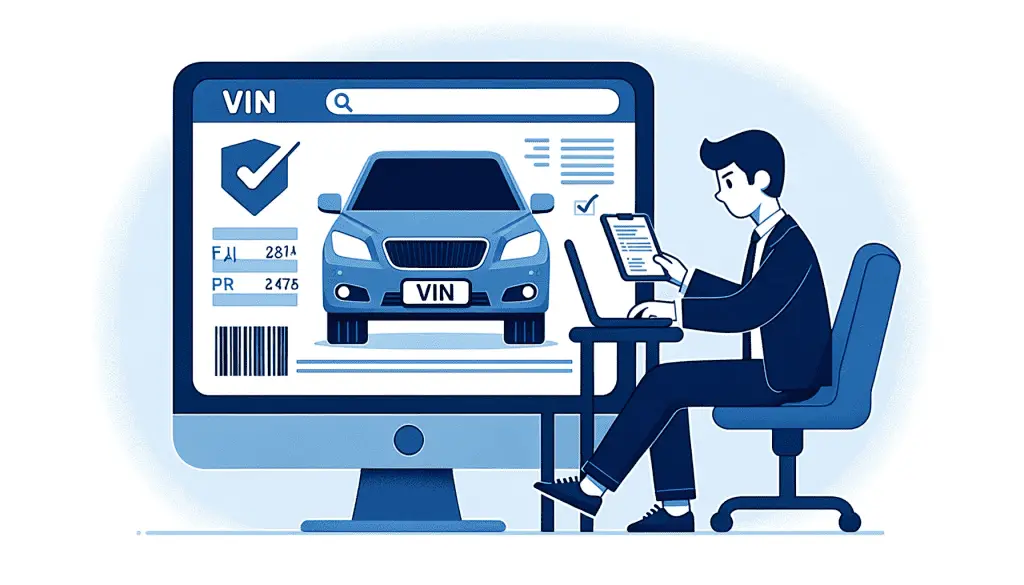
As a seller, you must never sell a car without first titling it in your name. Always formally sign over and transfer the title to the new buyer immediately. Maintain detailed records of the sale.
Following proper title transfer procedures as a buyer and seller is the best way to avoid the pitfalls of title jumping altogether.
| Step Number | Actionable Step | Description |
|---|---|---|
| 1 | Verify the Seller’s Identity | Ensure the seller’s name matches the name on the vehicle title. Ask for a government-issued ID for confirmation. |
| 2 | Check the Title Thoroughly | Examine the title for any alterations, erasures, or signs of forgery. |
| 3 | Use a Bill of Sale | Include names of both the buyer and seller, the sale price, and the vehicle identification number (VIN). |
| 4 | Immediate Title Transfer | Transfer the title to your name within the state’s specified time frame to avoid susceptibility to title jumping. |
| 5 | Visit the DMV Together | Go to the Department of Motor Vehicles (DMV) with the seller to ensure all paperwork is completed correctly. |
| 6 | Keep Records | Maintain a record of all documents, conversations, and transactions related to the vehicle purchase. |
| 7 | Consult a Legal Advisor | Consult a legal advisor specializing in vehicle transactions and title issues for any doubts or concerns. |
Conclusion and Summary
Hopefully, this guide has helped shed some light on stopping title jumping from both sides of the transaction.
My best advice as an experienced dealer is to be vigilant about following proper title transfer procedures, for both buyers and sellers.
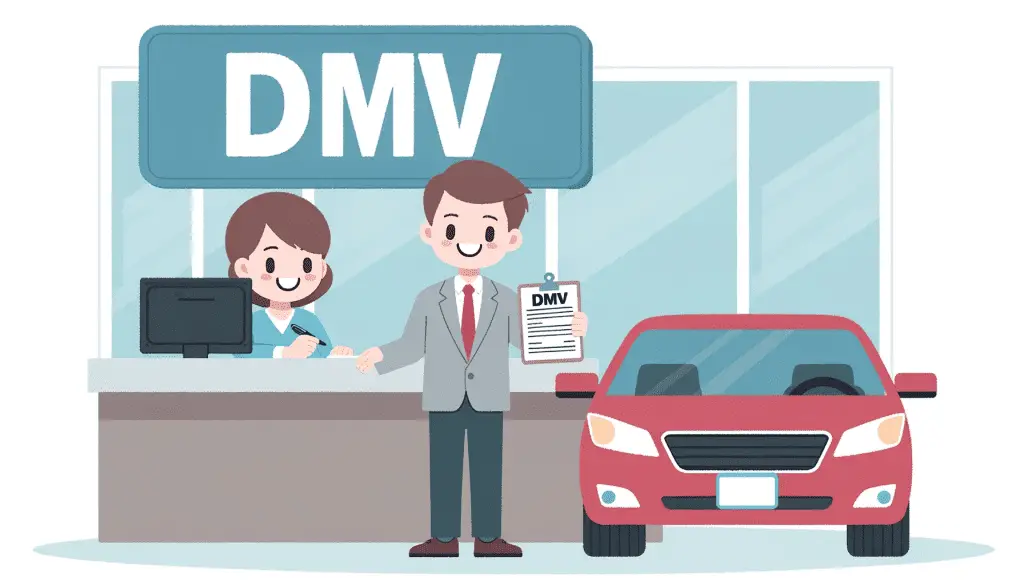
Don’t let the excitement of a good deal cloud your judgment – take the time to carefully inspect all documentation and confirm vehicles are properly titled beforehand.
It can save you countless headaches and legal issues down the road.
Buying A Car With The Title Already Signed
When the car you are buying comes with the title already signed (And does not have any buyer information filled out), you have what is called an Open Title.
This is when the owner of a vehicle has signed their name in the “Seller’s Section” of the title but failed to fill out any additional information about the sale, such as:
- Price
- Mileage
- Buyers Information
- And more…
Can You Sell A Car With No Title?
Most of the time, you cannot legally sell a car without a title. However, I do know of two options that may be available to you:
- A Surety Bond– Which we discuss in another article, “Transferring Car Titles And Vehicle Ownership”.
- Register your Vehicle in Vermont- If a vehicle is over 15 years of age, Vermont does not require a title to obtain a registration. All you need is a bill of sale, which doesn’t even need to be in the original owner’s name! That being said, this does not override the claim to ownership that the original title owner will have.
Title Jumping In California
I had to do some research on Jumping Titles in California, and it seems to hinge on a form called the “Release of Liability.” This is the form that sellers must complete when they sell their car, and it will contain a section where they must fill out the information of the buyer. If they fill out and submit this form on a car you bought from a third party via an Open title, the state will know the title is being jumped.
FAQ’s:
What If the Seller Forgot to Sign the Title?
If the Seller’s name (The person physically selling you the car) isn’t on the title, both you, this individual, and the original owner are jumping the title. The problem for you is- If the state DMV catches this, there will be no record of the seller, only you and the signed owner, leaving you responsible for a Felony.
What Does Curbstoning Mean?
Essentially, Curbstoning is where a Car Dealer presents themselves as a private seller to make the sale of a car. This is usually made possible by someone innocently selling/trading in a car at a dealership and leaving the dealer with an open title (A title they signed as the seller with the buyer section remaining blank).
Is Title Jumping Really A Felony?
Yes, Jumping Titles is a felony, and it is also illegal in all 50 states except in certain cases, such as when someone has passed away, and the family or next of kin wishes to sell the vehicle. You will face Fines, Penalties, and Possible Jail Time if you are caught Jumping or Skipping Vehicle Titles.
Sources Used To Create this Article:
- https://www.1800thelaw2.com/resources/vehicle-accident/title-jumping-what-happens-in-a-car-accident/
- https://www.dmv.ca.gov/portal/driver-education-and-safety/educational-materials/
- https://portal.ct.gov/dmv/vehicle-services/vehicle-title-service
- https://www.michigan.gov/sos/all-services/title-transfer-and-vehicle-registration

